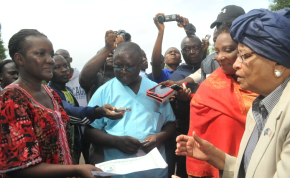 Photo: Liberia Government
Photo: Liberia Government
A physician assistant displays a certificate of full
recovery from Ebola to President Ellen Johnson Sirleaf.
'I know this guy'
Farley, who says he remembers Duncan when they were friends at the Buduburam Refugee Camp in Ghana, recalls that almost everyone residing in
the refugee camp was desperate to travel to America. "Everybody in that camp was desperate to go to America. Basically everybody went there (Ghana) for the resettlement, but it didn't work out. I also tried on many occasions and when it didn't work, I came back home. Everyone who came from Ghana and was on the camp, know that guy."
Farley says going to America is an opportunity everybody would wish for, even him. "It's only that I'm working now; I wouldn't want to live in America. While it is true I wanted to go to America back in the day, I'm almost 40 now, I won't want to go to America; I'd rather stay in Liberia where I have a job. From what I read on the internet if it is true then he was really desperate he wanted to go to America."
Farley recalls that Duncan was a loving person. "I knew Duncan well. As refugees in Bujumbura Camp we were there hustling to see how we could make it. We were at war back home, so we were like trying to do everything humanly possible to make sure we stay alive to come back home. So when the war ended we began to come home one by one and he came before me. I came in 2011. We met once and that was around the 72nd belt, somewhere around Boulevard Junction and we just waved to each other because I was in a taxi; that's the last time I saw him. When I saw his photo on Facebook, I was like 'oh! I know this guy'. "
Duncan's family in the U.S. has been supportive while denying that he had Ebola prior to entering the U.S., some have even gone as far as to suggest that Duncan took an Ebola test prior to his departure from Liberia, a point Tolbert Nyensuah, Assistant Minister for Curative and Preventive Services at the Ministry of Health and Social Welfare debunks. "There was no Ebola test given Mr. Duncan, what he was given at the airport was a temperature test, people should stop confusing the two."
Nyensuah says it is impossible for anyone to be tested for Ebola with showing the symptoms and that representatives of the U.S. Centers for Disease Control were on hand when Duncan was tested. "He was tested and showed no symptoms at departure but to say that he was given an Ebola test, is completely false, Nyensuah says. Many medical experts say, the 21-day incubation period for the Ebola virus makes it easy for anyone carrying the virus to slip out or into an airport undetected.
Although airport officials are on the lookout for signs of Ebola - including diarrhea, vomiting and bleeding - before passengers board flights from affected countries in West Africa, spotting those symptoms could take up to 21 days after a person has been infected to show up making it difficult to conduct testing for Ebola.
Clearance Could Take 42 Days
Reuters reported Sunday that it could take at least 42 days for all those who made contacts with Duncan to be in the clear from the virus. Health officials are reportedly watching 49 people in the Dallas area who may have had contact with him for symptoms of the deadly disease, even as it emerged Sunday that state and local health officials waited more than two days to perform blood tests that confirmed Duncan had Ebola, a delay that appears to have violated federal guidelines.
Farley dismisses suggestions from many critics who say Duncan's action and decision to lie on the health form at the airport was cruel."It would be too harsh for him. It was an opportunity, the country is virtually paralyzed; an able-body man who has not been working for the past five years, if you tell him to come go to America, even if you tell him to hang himself in America he would do it."
Despite his support for Duncan, Farley expresses disappointment that Duncan was not more forthcoming about his contact with Marthaline Williams, the pregnant woman who he unsuccessfully tried to get to a hospital. "My own disappointment in him is that after he knew he had contact with a sick person and not admitting he did that I think was cruel on his part. Maybe he was afraid that if he had said it, they would have denied him; that could be one of the factors why he lied.I want to encourage him; he needs everybody, let's just disregard whatever wrong he did, put it behind us and did bad, let's put it behind us and wish him well."
Prosecution looms
While many like Farley has been pressing for Liberians to forget Duncan's error in judgment, the final decision could rest in the arms of prosecutors in both Liberia and the state of Texas, where there has been expression of interests to prosecute Duncan for possibly lying on his health questionnaire at the Roberts International Airport even as he lies in critical condition at Texas Health Presbyterian Hospital in Dallas.
Authorities in Dallas are also pondering charges. County DA Craig Watkins said Saturday that his office is looking into the possibility of filing charges against Duncan for transporting the virus to the United States. Both Liberia and Dallas are investigating whether Eric Duncan knew he had been exposed to the Ebola virus before traveling to Dallas. "We're dealing with the issue that he may have knowingly exposed individuals in Dallas County to the Ebola virus" said Watkins. "We've prosecuted individuals, for knowingly exposing individuals to HIV - which is aggravated assault."

No comments:
Post a Comment